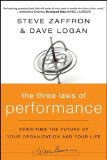The Three Laws of Performance
by Steve Zaffron and Dave Logan
The authors of this book, Steve Zaffron and Dave Logan, acknowledge Werner Erhard as as the developer of the original ideas upon which much of the material in the book is based.
Foreword by Michael C. Jensen, PhD.
I have no doubt that the ideas, distinctions, and methodologies that underlie what Steve and Dave so expertly present will have a substantial impact on the world. I am honored to be invited to write this foreword.
When I was first introduced to some of the ideas contained in this book I saw the extraordinary impact they made on the audience. I was struck by the enormous potential, relevance, and applicability of this approach to transforming human beings and organizations. But from my worldview I could not understand how this dramatic impact occurred. Since then I have spent considerable time and energy researching these ideas on my own and in collaboration with Steve and Dave with the intention to see them become universally available. It has not been a simple task. This book takes a substantial step toward accomplishing this aspiration. My congratulations!
I contacted Steve early in my efforts to get to the bottom of these ideas and to fully grasp their ability to dramatically influence the power and productivity of people and organizations. Much of my research and writing is now devoted to these efforts. In 1997 I was hitting the wall as a leader with my Faculty Unit at the Harvard Business School. To be blunt I was failing. I asked Steve to help and he generously agreed to work with me and my group (the Organizations and Markets Group at HBS). That two days of work (during which he undertook a task that most of us thought impossible in such a short time) put us, as a group, back on the track to becoming a formally sanctioned unit of HSB. For that, and for being the teacher, counselor, partner, and colleague that Steve has been for me, I am deeply grateful.
Steve has a proven track record over decades of designing and implementing large-scale initiatives that elevate organizational performance, and that talent was truly required to bringing the Organizations and Markets Group at HBS to its current status. I've been fortunate to both observe and work with Steve in designing and delivering programs in other client and academic settings. He is a master.
I met Dave Logan through the Barbados Group. Dave has a deep expertise in researching and designing programs that synthesize organizational change, management, and leadership. I have been privileged to work with him in delivering sessions of an executive development program for a large multinational company. I am always amazed at Dave’s ability to penetrate to the core of what it takes to bring about progress. I recall one particularly difficult situation I faced when Dave coached and guided me in a way that quickly turned this situation around. Dave is also a master.
I must recognize the members of the Barbados Group; in particular, Werner Erhard, for being the catalyst that brought these extraordinary thinkers together and for his superb leadership of the group’s discussions. I am deeply grateful for the contribution these conversations have made to me personally and to this book.
I especially invite all readers to be open to what may occur as an unfamiliar and perhaps even strange way to think about people and organizational issues.
There is much to learn and the payoffs are huge.
Michael C. Jensen
Jesse Isidor Straus, Professor of Business Emeritus
Harvard Business School
SSRN
BARTLEY J MADDEN, Senior Fellow at the National Center for Policy Analysis (NCPA), writes in his book, Reconstructing Your Worldview:
"Werner Erhard, Michael Jensen, and their Barbados Group colleagues – hereafter simply termed “EJB” – have developed a new paradigm for individual, group, and organizational performance. EJB’s new paradigm emphasizes how a person’s worldview shapes and constrains his or her perceptions. Their paradigm dives deep into the source of performance, which is not accessible by mere linear cause-and-effect analysis.
EJB assert that the level of performance that people achieve correlates with how work situations occur to them. Additionally, language – including what is said and unsaid in conversations – plays a dominant role in how situations occur to the performer. Therefore substantial gains in performance are more likely to be achieved after management gains an insightful understanding of how employees perceive the world and then orchestrates changes that make sense to employees and elicit enthusiastic support. EJB make the following distinctions to explain the logic of their approach to improving performance:
Action is a correlate of the way the circumstances on which and in which a performer is performing occur (show up) for the performer… “Occur” does not require the performer to pay any attention to, thik about, understand, analyze, or interpret that which is registered.
…The world we interact with (act on and by which we are acted on) is the so-called objective world. However, while most of us don’t give any thought to it, in a fundamentally important sense the world we actually respond to and react to is the world as we perceive it, what we have termed the occurring world.
…If we are dealing with life as lived, or performance as lived (the perspective of this new paradigm of performance), seeing and treating the objective and occurring worlds from the perspective of them being two distinct and separate worlds obscures the way we actually live life and love performance… The as-lived perspective allows access to the source of performance.
An insightful presentation of the application of these ideas is provided by Barbados Group members Steve Zaffron and Dave Logan in their book The Three Laws of Performance. Zaffron and Logan describe how employees – and people in general – have a deeply felt default future: that is, what they believe they know will happen. This strongly influences how the world occurs to them and, hence, their performance.
We all use descriptive language to create “facts” and to describe our reality; this type of language, more often than not, binds and constrains us. Rewriting the future involves dealing with the past so that it no longer constrains us. In this way we can create space for new possibilities. Rewriting our default future involves generative language – a language composed of declaration, commitment, promises, and requests. Generative language is really about transforming, rather than describing, how a situation occurs.
A future we create for ourselves and others, one that offers high potential rewards for everyone involved, is most likely to be achieved, say Zaffron and Logan, through effective leadership. This entails that: (1) leaders have a say, and give others a say, in how situations occur; (2) leaders master the conversational environment; and (3) leaders listen for the future of their organizations. In a nutshell, the success of managers’ change initiatives depends upon how successfully they analyze how the world occurs to their employees.
A centerpiece of EJB’s new paradigm is the emphasis on integrity, on keeping one’s word; this has a significant impact on performance. Jensen says it well:
"Integrity is important to individuals, groups, organizations and society because it creates workability. Without integrity, the workability of any object, system, person, group or organization declines; and as workability declines, the opportunity for performance declines. Therefore, integrity is a necessary condition for maximum performance. As an added benefit, honoring one’s word is also an actionable pathway to being trusted by others."
The possibility to create the context in which people’s lives really matter is undoubtedly the most profound opportunity available to anyone, ever.
Werner Erhard
________________________


